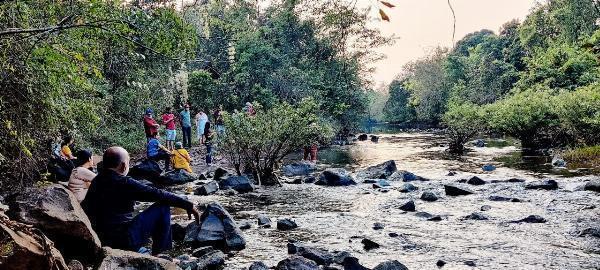Experts raise red flags over unusual phenomenon observed in mountain region: 'It's suffocating'
Scientists say hot, humid weather is to blame for the glaciers melting in Kashmir, India, according to Rising Kashmir.
"It's suffocating," said local resident Sajjad Ahmad.
What's happening?
India's Kashmir Valley is experiencing a surge in humidity levels that is unusual for the summertime, which is usually dry and temperate. The humidity is causing locals a lot of discomfort, making the unusually high temperatures feel oppressive.
Scientists are attributing the humidity to a combination of factors, including rapid glacial melt, altered wind patterns, and changing monsoon behaviors, all of which indicate that the region is experiencing climate stress.
The glacier melt is having a particularly large impact because rising river levels are creating increased moisture in the atmosphere.
Deforestation and development have worsened the problem.
Dr. Yasir Yousuf, an environmentalist based in Kashmir, cautions that if these warning signs are ignored, it could lead to irreversible crises for the ecology and local humanity.
Why is glacier melt in Kashmir important?
Scientists are urging people to prioritize glacier conservation, stop construction in eco-sensitive areas, and restore the forest floor.
The heat has become unbearable for residents and has had a direct impact on their health. Local hospitals have seen an influx of patients being treated with skin infections, dehydration, and respiratory problems. Dr. Ruqaya Qureshi, a physician at SMHS hospital in Srinagar, explained that the high humidity levels in the atmosphere disrupt the body's cooling mechanism, which is dangerous to human health. She is especially concerned for children and the elderly, the most vulnerable segments of the population.
Ice melt impacts our planet, causing communities to suffer due to higher tides during extreme weather events, disruptions to food systems, and an increased spread of disease. Although isolated weather events have always existed, the scientific consensus is that human actions and inactions have induced the general warming of the planet. This change has supercharged the weather events, making them more powerful and dangerous.
Do you worry about the quality of the air inside your home?
Yes — often
Yes — but only sometimes
Only when it's bad outside
No — I never do
Click your choice to see results and speak your mind.
What's being done about glacier melt?
Worldwide, cities are taking steps to reduce the pollution that is contributing to the planet's overheating. Tokyo is requiring new homes to have solar panels, and Los Angeles outlawed gas power in all new buildings.
As individuals, we can help by supporting pro-climate candidates and making sustainable choices. Recycling, composting, and conserving resources such as electricity and water are simple actions we can take.
Dr. Mir Asif, a climatologist from North Kashmir, is sounding the alarm. "If glaciers disappear, so does our water, our agriculture, and our very identity," he warned.
Join our free newsletter for good news and useful tips, and don't miss this cool list of easy ways to help yourself while helping the planet.










![Structural Adhesives Market [2028] Exploring Potential, Growth, Future & Trends](http://www.paseban.com/zb_users/upload/2025/08/20250831123209175661472915180.jpg)


